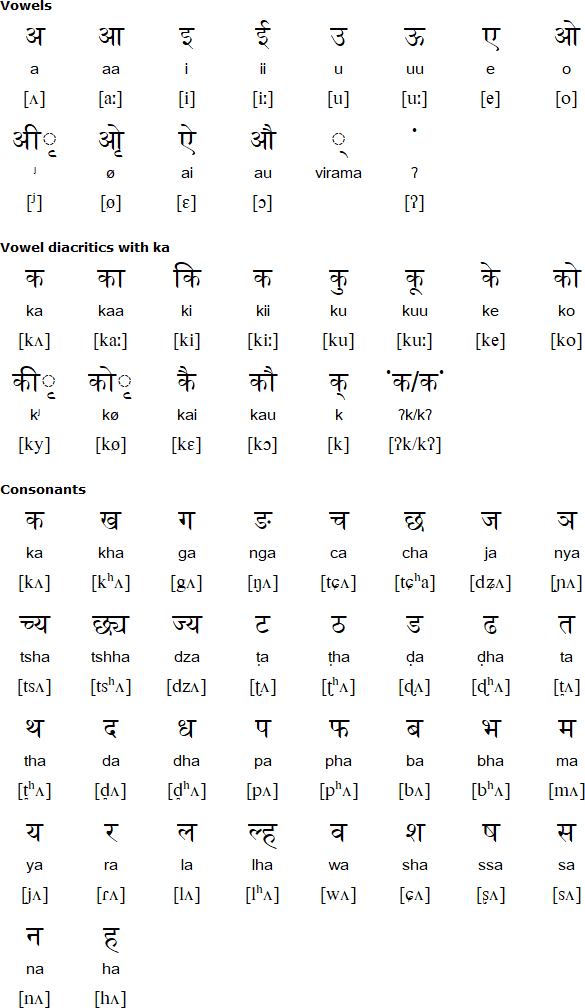Lhomi is a member of the Central Bodish branch of the Tibeto-Burman language family. It is spoken mainly in the Kosi Zone of eastern Nepal, particularly in the Arun valley in northern Sankhuwasabha district. In 2014 there were about 7,000 speakers of Lhomi in Nepal.
There are also about 1,000 speakers of Lhomi in Tibet Automomous Region of China, and about 1,320 in Darjeeling in West Bengal in the northeast of India.
Lhomi is also known as Lhoket, Lhomi dzyükki keccyok or Lhomiki keccyok. The name Lhomi means "southern language". Lhomi speakers are also known as Shingsaba.
Lhomi is used in literature and newspapers in Nepal, and is written with the Devanagari alphabet. Most Lhomi speakers also speak Nepali, and speakers of Eastern Tamang, Gurung, Khaling, Naaba and Thudam use Lhomi as a second language.

Download an alphabet chart for Lhomi (Excel)
Source: New Testament in Lhomi, Nepal Bible Society, Kathmandu
Source: https://www.kingjamesbibleonline.org/Matthew-1-1/
Details provided by Biswajit Mandal (biswajitmandal[dot]bm90[at]gmail[dot]com)
वाङज्य धाङ् मि थोङ् छयीलेक्ल तेन कुरीक्कराङ् आमे ढोप्पनी राङ्मेने धाङ् वाङ्ज्यदी डस्सी डस्सी खुन्न योङ्गेन् बेत् । उब घायेत् स्यिरप् रिक्प ढोप्पे नाङ्नीराङ् खुन्न किगेन् बेत् । उगी भियनी च्यिक्ताङ् च्यिक्ल आज्यी नुमु तोदो मिङ्बुगी धम्जीक् स्योक्कोकेन् बेत् ।
Waangajng dhaang mi thong chayiilekla tena kuriikkaraang aame ḍhiippanii raangmen dhaang waangjyii ḍassii ḍassii khunna yonggen bet. Uba ghaayrt syirap rikpa ḍoppe naangniiraang khunna kigen bet. Uge bhiyanii cyiktaang cyikla aajyii numu todo mingbugii dhamjiik syokkoken bet.
All human beings are born free and equal in dignity and rights. They are endowed with reason and conscience and should act towards one another in a spirit of brotherhood.
(Article 1 of the Universal Declaration of Human Rights)
Source: https://www.ohchr.org
Information about Lhomi
https://www.ethnologue.com/language/lhm
A Grammar Sketch of Lhomi
https://www.indigenousvoice.com/en/indigenous-peoples/9/lhomi-shingsaba.html
https://en.wikipedia.org/wiki/Central_Tibetan_language
Arakanese, Balti, Chocha Ngacha, Drung, Hajong, Hmar, Jingpho, Lepcha, Lhao Vo, Lhomi, Magar, Manipuri, Mro, Naxi, Newar, Pahari, Tangkhul Naga, Tujia, Yolmo
Aka-Jeru, Angika, Athpare, Avestan, Awadhi, Bahing, Balti, Bantawa, Belhare, Bhili, Bhumij, Bilaspuri, Bodo, Bhojpuri, Braj, Car, Chamling, Chhantyal, Chhattisgarhi, Chambeali, Danwar, Dhatki, Dhimal, Dhundari, Digaro Mishmi, Dogri, Doteli, Gaddi, Garhwali, Gondi, Gurung, Halbi, Haryanvi, Hill Miri, Hindi, Ho, Jarawa, Jaunsari, Jirel, Jumli, Kagate, Kannauji, Kham, Kangri, Kashmiri, Khaling, Khandeshi, Kharia, Khortha, Korku, Konkani, Kullui, Kumaoni, Kurmali, Kurukh, Kusunda, Lambadi, Limbu, Lhomi, Lhowa, Magahi, Magar, Mahasu Pahari, Maithili, Maldivian, Malto, Mandeali, Marathi, Marwari, Mewari, Mundari, Nancowry. Newar, Nepali, Nimadi, Nishi, Onge, Pahari, Pali, Pangwali, Rajasthani, Rajbanshi, Rangpuri, Sadri, Sanskrit, Santali, Saraiki, Sirmauri, Sherpa, Shina, Sindhi, Sunwar, Sylheti, Tamang, Thakali, Thangmi, Wambule, Wancho, Yakkha, Yolmo
Page last modified: 23.04.21
[top]
You can support this site by Buying Me A Coffee, and if you like what you see on this page, you can use the buttons below to share it with people you know.

If you like this site and find it useful, you can support it by making a donation via PayPal or Patreon, or by contributing in other ways. Omniglot is how I make my living.
Note: all links on this site to Amazon.com, Amazon.co.uk
and Amazon.fr
are affiliate links. This means I earn a commission if you click on any of them and buy something. So by clicking on these links you can help to support this site.
[top]